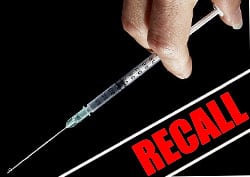
A new study reveals a spike in medical device recalls, with an increase in excess of 160% in the first quarter of this year alone. This huge increase translates into five times as many medical devices affected in recalls versus the last quarter of 2011, according to the just-released quarterly ExpertRECALL Index. Consumer product recalls […]
 A new study reveals a spike in medical device recalls, with an increase in excess of 160% in the first quarter of this year alone.
A new study reveals a spike in medical device recalls, with an increase in excess of 160% in the first quarter of this year alone.
This huge increase translates into five times as many medical devices affected in recalls versus the last quarter of 2011, according to the just-released quarterly ExpertRECALL Index. Consumer product recalls also increased in this year’s first quarter, although pharmaceutical and food recalls dropped when compared to prior quarters.
Medical device recalls involved include alcohol prep pads, catheters, needles, and latex gloves. In the first quarter, documented medical device recalls, by U.S. Food and Drug Administration (FDA) Enforcement Reports, involved a massive 82 million units, representing 508% increase over the prior quarter and represents a five-quarter high. Significantly, about one-third of the companies that faced recalls in the first quarter of 2012 were also involved in multiple medical device recall events, another trend that has been seen over the past five recent quarters.
“While the quarter-over-quarter increase in medical device recalls is significant, this change was not all that unexpected given that recalls documented in fourth quarter 2011 Enforcement Reports were at an unprecedented low,” explained Mike Rozembajgier, vice president of recalls at Stericycle ExpertRECALL. “However, what is troublesome is the dramatic increase in units affected by the recalls and continued number of repeat offenders. It’s scary to think about given the increasing number of devices that American patients rely on to maintain and improve their health. Consumer and patient safety should be the number-one priority for every manufacturer, distributor, retailer, doctor’s office, and healthcare facility.”
Rozembajgier also pointed out that “Companies should be doing everything possible to minimize the safety concerns that would result in recalls. Similarly, any business or individual within a supply chain, whether a distributor or a doctor, should keep close tabs on the products they handle to ensure that potential safety concerns are identified early and reported to the manufacturer and the regulatory agency. This due diligence ensures that the impact of recalls, when they do happen, is minimized. Ultimately fewer units, and thus fewer consumers, will be affected.”
Advocates have long criticized how some medical devices are brought to market, specifically, a class of medical devices that do not need to undergo human testing before they are brought to market. This may account for recent recall increases.
510(k) approvals, which do not require human clinical trials, are permitted for medical devices proven to be “substantially” equivalent to products already on the market. The 510(k) program is a frequent target of critics who say it is too lax and, last summer, the Institute of Medicine issued a report highlighting deficiencies with 510(k) clearances and recommended that the FDA scrap the program entirely.
Several types of medical implants approved via 510(k) protocols have been the subject of complaints, safety reviews, and lawsuits. Chief among these are metal-on-metal hip implants, including the now-recalled ASR hip implant manufactured by DePuy Orthopaedics and transvaginal mesh devices used in pelvic organ prolapse (POP) repair.


